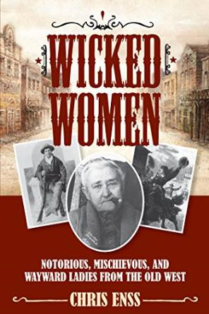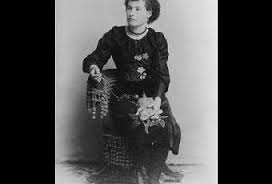Tune in to the Dead Files on Saturday, August 12, and watch the episode
The Devil Inside. I provided the on-camera historical interview.
Check local listings for the time when the episode will air.

1896- Nogales, Arizona Territory- lawmen fought a gun battle with the Black Jack Ketchum gang when it attempted to rob a bank in Nogales, driving off the outlaws. One of the lawmen was Frank King, a dedicated lawman who served as a deputy sheriff in Phoenix, Arizona Territory, during the 1880s, and in Texas, New Mexico, and California in the following decade. While serving a brief term as a guard at the Yuma Prison in 1889, a massive prison break was attempted in which five prisoners were shot to death, most of them by sharpshooter King the only man in the main tower at the time. King lived into the 1920s and was considered one of the toughest lawmen of his era.

Rosa May sat beside the bed of a dying miner and wiped the sweat off his feverish brow. She looked around his rustic, one-room cabin, past the sparse furnishings, and fixed her eyes on a tattered photograph of an elderly man and woman. “Those are my folks,” the man weakly told her. “They’re in Marshall County, Illinois. Where are your folks?”
The question stunned Rosa. No one ever asked about such things. No one ever asked her much at all. Conversation wasn’t what men were looking for when they did business with her. Rosa glanced out the window at a couple of respectable, well-dressed women. They watched her through the clouded glass, pointed, and whispered. She knew what they were saying without hearing it.
Rosa was just one of a handful of “sporting women” living in Bodie, California, in 1900 and she knew what people thought of her. It used to bother her years ago, but not now. It was an occupational hazard she’d learned to live with.
“Don’t you have people anywhere?” the miner asked. Rosa dabbed the man’s head with a cloth and smiled. “I don’t know anymore,” she answered. “If I did have they’d be back in Pennsylvania.”
Rosa’s parents were Irish – hard, strict people. Rosa had dreamed of the day she would be out of their puritanical household. She had left home in 1871, at the age of sixteen and soon found there weren’t many opportunities for a poor, petite, uneducated girl with brown eyes and dark, curly hair. She ended up in New York, hungry, homeless, and eager to take any job offered. The job offered was prostitution and five years later she came west with other women of her trade, hoping to make a fortune off the gold and silver miners.
Prostitution was the single largest occupation for women in the West. Rosa hoped to secure a position at a posh brothel with crystal chandeliers, velvet curtains, and flowing champagne. The madams who ran such places were good to their girls. They paid them a regular salary, taught them about makeup, manners, and how to dress, and they only had to entertain a few men a night. If a high-class brothel wasn’t available, Rosa could take a job in a second-class house and work for a percentage of the profits, turning as many tricks as she could each night. If all failed, she could be a street walker or rent a “crib” at a boardinghouse. Cribs, tiny, windowless chambers, had oilcloths draped across the foot of the bed for customers in too big of a hurry to take off their boots.
Rosa May arrived in Virginia City, Nevada in 1875 and went to work for a madam known as Cad Thompson. Cad was a widow who ran several parlor houses in town, including a three-story, brick structure called the “Brick House.” Cad and Rosa became fast friends, confiding in one another and talking about meeting their Prince Charming. “Whores dream of falling in love, too,” Cad frequently told Rosa.

1876- Deadwood, Dakota Territory- Wild Bill (James Butler) Hickok was killed from behind while playing cards in Saloon # 10 by Jack McCall, a desperado from Texas. Legend has it that the poker hand Hickok was holding when he died consisted of a pair of black aces and a pair of black eights. This combination became known as the dead man’s hand. Hickok was a Union army spy, a scout for General Custer, and a marshal for Abilene, Kansas, as well as a flamboyant gambler.

The effect of vice upon the destiny of the expanding western frontier was considered by some religious and political leaders in the mid-1850s to be a sign of a rotten and decaying civilization. In 1856, Methodist pastor John M. Chivington told a congregation in Nebraska that “the extravagant development of immorality, particularly the development of immoral women given to gambling, whiskey drinking and prostitution, marked the decadence of a potentially great nation.” Ernest A. Bell, the secretary of the Illinois Vigilance Association maintained that “from the day the serpent lured the first woman in the garden there have been few days and nights when some daughter of Eve’s has not been deceived into a wicked life by some serpent or other. It has not changed and will not change.”
In 1849, women of easy virtue found wicked lives west of the Mississippi when they followed fortune hunters seeking gold and land in an unsettled territory. Prostitutes and female gamblers hoped to capitalize on the vices of the intrepid pioneers.
According to records at the California State Historical Library, more than half of the working women in the West during the 1870s were prostitutes. At that time, madams – those women who owned, managed, and maintained brothels – were generally the only women out west who appeared to be in control of their own destinies. For that reason alone, the prospect of a career in the “oldest profession” – at least at the outset – must have seemed promising.
Often referred to as “sporting women” and “soiled doves,” prostitutes mostly ranged in age from seventeen to twenty-five, although girls as young as fourteen were sometimes hired. Women over twenty-eight years of age were generally considered too old to be prostitutes.
Rarely, if ever, did working women use their real names. In order to avoid trouble with the law as they traveled from town to town and to protect their true identities, many of these women adopted colorful new handles like Contrary Mary, Little Gold Dollar, Lazy Kate, and Honolulu Nell. The vicinities where their businesses were located were also given distinctive names. Bordellos and parlor houses typically thrived in that part of the city known as “the half world,” “the badlands,” “the tenderloin,” “the twilight zone,” or the red-light district.”
The term “red-light district” originated in Kansas. As a way of discouraging would-be intruders brazen railroad workers around Dodge City began hanging their red brakemen’s lanterns outside their doors as signal that they were in the company of a lady of the evening. The colorful custom was quickly adopted by many ladies and their madams.

1880- Tombstone, Arizona Territory- the Tombstone Epitaph congratulates Wyatt Earp on his appointment by Sheriff Shibell to civil deputy sheriff for the Tombstone area. Virgil was a special officer under Marshall White. The paper also added, “Morgan Earp succeeds his brother as shotgun messenger for Wells, Fargo & Co.”

Libby Thompson twirled gracefully around the dance floor of the Sweetwater Saloon in Sweetwater, Texas. A banjo and piano player performed a clumsy rendition of the house favorite, “Sweet Betsy From Pike.” Libby made a valiant effort to match her talent with the musician’s limited skills. The rough crowd around her was not interested in the out of tune playing; their eyes were fixed on the billowing folds of her flaming red costume. The rowdy men hoped to catch a peek at Libby’s shapely, bare legs underneath the yards of fabric on her skirt. Libby was careful to only let them see enough to keep them interested.
Many of the cowboy customers were spattered with alkali dust, grease, or plain dirt. They stretched their eager unkempt hands out to touch Libby as she pranced by, but she managed to avoid all contact. At the end of the performance, she was showered with applause, cheers, and requests to see more. Libby was not in an obliging mood. She smiled, bowed, and hurried past the enthusiastic audience as she made her way to the bar for a drink.
A surly bartender served her a glass of apple whiskey, and she headed off to the back of the room with her beverage. When she wasn’t entertaining patrons, Libby could be found at her usual corner spot by the stairs. A large, purple, velvet chair waited for her there along with her pets, a pair of prairie dogs. As Libby walked through the mass of people to her spot, she saw three grimy, bearded men surrounding her seat. One of the inebriated cowhands was poking at her animals with a long stick.
“Boys, I’d thank you kindly to stop that,” she warned the unruly trio. The men turned to see who was speaking then broke into a hearty laugh once they saw her. Ignoring the dancer they resumed their harassment of the small dogs. The animals batted the stick back as it neared them, and each time the men would erupt with laughter.
Libby watched the three for a few moments then slowly reached into her drawstring purse and removed a pistol. Pointing the gun at the men she said, “Don’t make me ask you again.” The drunken cowhands turned to face Libby, and she aimed her pistol at the head of the man with the stick. Laughing, the man told her to “go to hell.” “I’m on my way,” she responded, pulling the hammer back on the gun. “But I don’t mind sending you there first so you can warn them,” she added. The cowboy dropped the stick, and he and his friends backed away from Libby’s chair. One by one they staggered out the saloon. Libby put the gun back into her purse, scooped up her frightened pets, scratched their heads, and kissed them repeatedly.

1878-California- Black Bart held up another Wells Fargo stage, one traveling between Quincy and Oroville, Calif. Again, he wore the same weird outfit, the long flowing duster and the flour sack, and again, his voice, described as “hollow and deep,” ordered the driver to “throw down the box!” This time Bart made off with $379. He also helped himself to a passenger’s $200 diamond ring and a gold watch worth $25. Once more, pursuing lawmen found the empty strongbox with another note which stated: “Here I lay me down to sleep, To wait the coming morrow, Perhaps success, perhaps defeat, And everlasting sorrow. Yet come what will, I’ll try it once, My conditions can’t be worse, And if there’s money in that box, ‘Tis money in my purse.”